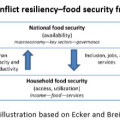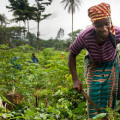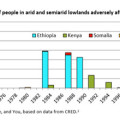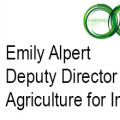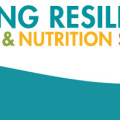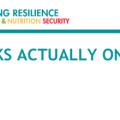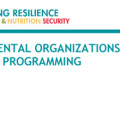The resilience dividend
“Resilience will pay dividends for fragile communities who today face environmental, economic and nutritional bankruptcy. For the people in communities affected by droughts, floods and other shocks, a resilience approach allows multiple entry points for action that can both restore the productivity of lands and significantly improve well-being. Empowering resilient families to withstand shocks can >> Read more
Highlights from Conference Brief 3: Building resilience to conflict through food security policies and programs
Food insecurity and conflict often go hand-in-hand: a lack of food can ignite conflict and conflict can result in food shortages and unavailability. What’s more, the scope of the problem is far reaching, as more than one and a half billion people live in areas impacted by conflict. In their 2020 Conference Brief, Building Resilience >> Read more
Building resilience from within: Highlights from the opening session of the 2020 Conference
“If the past is any guide, we will face a barrage of shocks, both natural and man‐made, in the coming years. In just the past five years, we have seen a major earthquake in Haiti; drought in the Horn of Africa; earthquake, tsunami, and nuclear crisis in Japan; and conflicts that have left millions of >> Read more
African smallholder farm families have lost the elasticity to bounce back!
The following post by Lindiwe Majele Sibanda, Chief Executive Officer of the Africa-wide Food, Agriculture and Natural Resources Policy Analysis Network (FANRPAN), is an excerpted version of a story that originally appeared on the CGIAR Research Program on Water, Land and Ecosystems (WLE) Agriculture and Ecosystems Blog as part of their month-long series on Resilience. >> Read more
Highlights From Conference Briefs 12 and 14: Building Resilience In The Face Of Conflict
In the past few decades, food-related challenges like climate change and food and nutrition security coupled with other social and political issues have led to conflict and unrest on both the national and regional scale. Climatic shocks are considered to be one of the root causes of conflict, especially in resource-constrained settings. At the same time, conflicts tend to exacerbate existing vulnerability, leading to poverty‐conflict traps at the household, community, and national levels. In their conference brief, Margherita Calderone, Derek Headey, and Jean-François Maystadt review the research about the impact of climate change >> Read more
Can you be resilient on one acre or less?
Our guest author, Emily Alpert, Deputy Director of Agriculture for Impact, concludes our series of blog articles on resilience published in partnership with Farming First ahead of the conference “Building Resilience for Food and Nutrition Security” 15-17 May 2014. An acre is about the size of a football pitch. That might seem like a lot, but if your >> Read more
2020 Conference officially underway
The 2020 Conference on "Building Resilience for Food and Nutrition Security" officially kicked off in Addis Ababa this morning with the first round of side events. The three-day event, which is being attended by more than 800 experts and practitioners from food, nutrition, health, agriculture, humanitarian, and related development sectors, aims to incorporate resilience into >> Read more
Highlights from Conference Brief 5: Are Shocks Actually on the Rise?
From extreme weather events to rising and highly volatile food prices, poor and vulnerable populations are subject to a bevy of shocks that threaten their basic food and nutrition security. In the face of global climate change and other recent food price spikes, it seems to many that such events are occurring more and more >> Read more
Highlights from 2020 Conference Brief 7: Nongovernmental organizations’ approaches to resilience programming
Stories of nongovernmental organizations (NGOs) providing emergency relief in the aftermath of natural disasters and other humanitarian crises are familiar parts of the news. When NGOs such as CARE or Mercy Corps support medical services in South Sudan or bring food to people affected by Typhoon Haiyan in the Philippines, we are not surprised. Less >> Read more
- « Previous Page
- 1
- …
- 3
- 4
- 5
- 6
- 7
- …
- 10
- Next Page »



